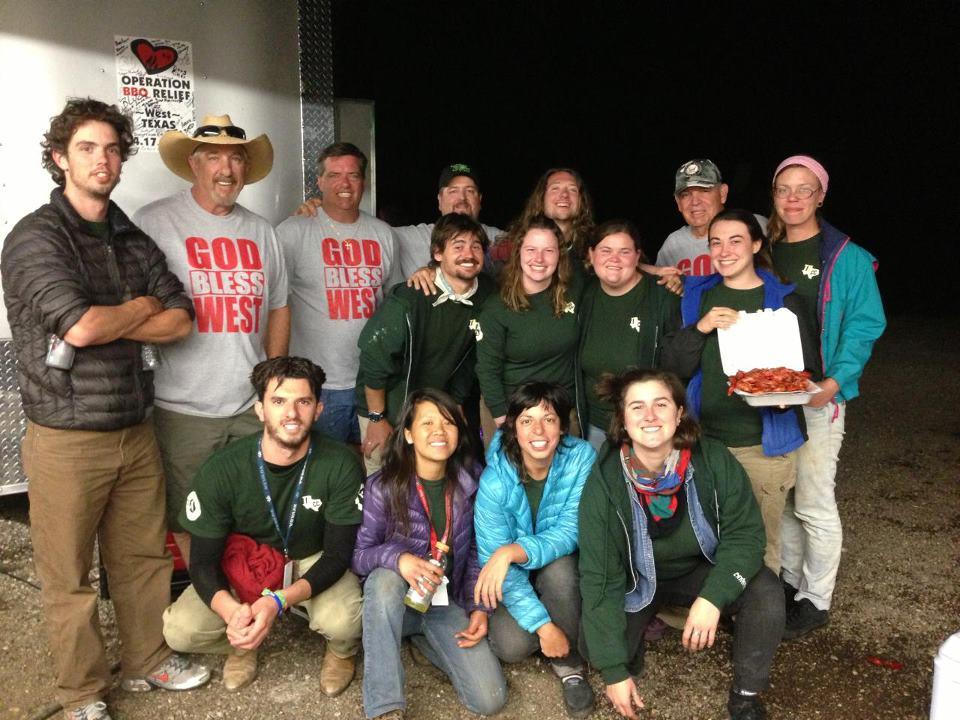
A member of the Texas Conservation Corps reflects on her experience assisting with disaster relief in West, TX – the location of an April 2013 fertilizer plant explosion that injured over 200 people and killed 15.
Taken from the Texas Conservation Corps blog
– by Heather Kouros, Corpsmember
The term disaster can refer to an event, or series of events, natural or human induced that causes a significant amount of damage; whether it be in loss of lives or in the physical shifting of the environment. “Disaster” in and of itself doesn’t refer to a specific event, but rather to its scale, its effect. Since returning from my 2 weeks in West, working disaster relief and thinking about disaster, the main idea that keeps coming back to me is the severing that occurs when disaster strikes. The disruption of time and space, of a place and its functions. The expulsion of a people from the routine of their daily lives, into something unimaginable, with no set guidelines or instruction manual. This is certainly the case for the town of West, Texas, a small community of about 3,000, that became a household name when a fertilizer plant exploded on April 17th,2013.
As TxCC’s Emergency Response Team working in West, our goal was to help facilitate the transition into this new reality. We dealt with critical aspects of disaster recovery that can be neglected when tragedy hits: donations and volunteer management. After deploying to West, our crew was hit with the insanity of West Fest Fairgrounds donation site, the major drop off and distribution center for donations that oversaw over 120 tons of donations. Displaced residents, unclear of the fates of their homes and families members, picked through piles of donations. Over 5,000 volunteers came to help during our time here. We recorded their volunteer hours and other data so that their presence will help reduce the local cost of the disaster and then we coordinated precise locations and tasks so that their work could be best utilized.
Upon learning the Incident Command operational systems from the immediate responders, Team Rubicon, our crews were thrown into the field. The entire location was our responsibility; feeding, volunteer reception and coordination and handling the tons of donations that were received daily. We developed a volunteer reception center that could handle the flow of people coming to lend a hand, and directed these people to crew members working in the warehouse itself for task delegation. We also had a team of people in the office, updating reports and data. We received contact information for the hundreds of people offering services, developed a media management program, made site maps of affected areas, and put up a facebook page as an informational resource.
As operations expanded over the course of the next few days, our responsibilities shifted from West Fest to the other locations that were providing relief and resources. ERT members were stationed at the Joint Assistance Facility (JAC), where they assisted over 80 homeowners with intake forms so that they could receive free assistance from volunteer organizations. Team members coordinated volunteers with locations needing assistance all over the city, and arranged for critical resources to be brought into the areas most devastated by the explosion. We managed reentry registration, handing out damage assessments to affected homeowners and helping guide them to the resources they needed. We developed a database for volunteer hours and homeowner intake forms that was maintained daily, and served as an informational platform to the public. We dedicated our time to creating a structure that could be transitioned to city appointed leaders, who would lead the long term recovery program.
The deployment in West was our crew’s first experience leading during a disaster, and we all struggled and overcame the challenges it presented together. We worked fourteen hour days, getting lost in our work and all that needed to be done, and slept in the office that served as our home base. We cried with each other from the stress, bad food and exhaustion, but also for the tragedy and grief of our temporary home and all the people in it we had quickly come to love. We helped people find their dogs, we listened to their stories, we fed them and ate (too much) and we bonded about Jesus. We even met Batman, the weirdest and most righteous volunteer ever. We learned about resilience and optimism, and that people can get through the unimaginable if they stick together.





































































